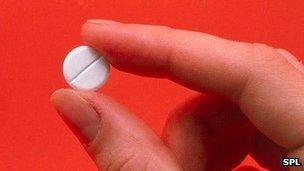Aspirin 'may prevent skin cancer'
- Published

The jury is still out on whether aspirin is effective at preventing cancers
An aspirin a day may protect against skin cancer, some experts believe.
People who take aspirin tablets or similar painkillers on a regular basis cut their risk of developing skin cancer - including the most deadly type - malignant melanoma - by about 15%, research suggests.
The work in the journal Cancer involved nearly 200,000 people in Denmark.
But experts say using sunscreen and avoiding too much sun are still the best ways to prevent skin cancer.
Anti-cancer pill?
In the study, approximately 18,000 of the 200,000 participants had been diagnosed with of one of three types of skin cancer - basal cell carcinoma, squamous cell carcinoma, or the rarer but more dangerous malignant melanoma.
The researchers looked at the medical records of the individuals to calculate how many had been prescribed non-steroidal anti-inflammatory drugs (NSAIDs) such as aspirin, ibuprofen and naproxen over an eight-year period.
Many were taking them for heart conditions or arthritis.
Those who were more frequently prescribed NSAIDs were less likely to have skin cancer.
The higher the dose and the longer a person had been on the medication, the greater the protective effect.
Individuals with more than two prescriptions for NSAIDs had a 15% decreased risk for developing squamous cell carcinoma and a 13% lower risk of malignant melanoma.
NSAIDs did not appear to lower the overall risk of basal cell carcinoma - the most common and least aggressive type of skin cancer. But they did cut the risk of basal cell carcinomas developing on certain parts of the body other than the head and neck.
Limitations
The researchers from the University Hospital in Denmark say more research is needed to confirm and further explain their findings.
Studies in animals suggest NSAIDs may block the growth of early pre-cancerous skin lesions, but it is not yet clear if this is also the case in humans.
Scientists already suspect that these drugs may protect against many other cancers, including bowel cancer.
The researchers point out that although they found a link with prescriptions they were not able to monitor precisely how much of the drug a person actually took. Also, people can buy drugs like aspirin from a pharmacy without a prescription.
And they did not look at sun exposure - the root cause of skin cancer.
Experts say even if NSAIDs do offer some protection against skin cancer, people still need to be sensible in the sun.
Hazel Nunn of Cancer Research UK said: "By far and away the best way to reduce the risk of skin cancer is to enjoy the sun safely, and take care to avoid sunburn.
"Sunburn's a clear sign that your skin's been damaged, and this damage can build up over time and lead to skin cancer in the future. When the sun's strong, use a combination of shade, clothes and at least SPF 15 sunscreen to protect your skin.
"There is mounting evidence that aspirin does reduce the risk of some cancers, but it's too soon to say if this includes skin cancer. Aspirin can have serious side effects - so it's important to talk to a doctor about the risks and benefits if you're thinking of taking it regularly."
- Published20 March 2012
- Published21 March 2012